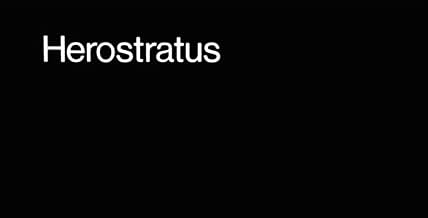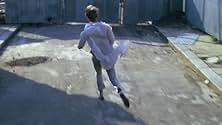When young poet Max (Michael Gothard) hires a marketing company to turn his suicide-by-jumping into a mass-media spectacle, he finds that his subversive intentions are quickly diluted into a... Read allWhen young poet Max (Michael Gothard) hires a marketing company to turn his suicide-by-jumping into a mass-media spectacle, he finds that his subversive intentions are quickly diluted into a reactionary gesture, and his motivations are revealed as a desperate attempt to seek atte... Read allWhen young poet Max (Michael Gothard) hires a marketing company to turn his suicide-by-jumping into a mass-media spectacle, he finds that his subversive intentions are quickly diluted into a reactionary gesture, and his motivations are revealed as a desperate attempt to seek attention through celebrity.
- Director
- Writers
- All cast & crew
- Production, box office & more at IMDbPro
Featured reviews
Sadly, dated
Herostratus
Like others who have written here about HEROSTRATUS, I too saw this amazing and unforgettable film in the early 70's. I have subsequently longed to see it again.
This film is what I like to call "transformative" cinema. Tranformative in the way the films of Bergman, Pasolini, Godard & DaSica can be. You may detest this film. But, you will not easily forget it.
I'd also like to say that if you like the novels of J.G.Ballard, particularly the books of the 70's, you will probably appreciate this film. I've always considered it particularly "Ballardian". This film grabs corporate capitalism by the throat. Yes, it is cynical.
I am happy to report that Herostratus is now available on DVD. It can be obtained at Amazon UK.
Synopses from original brochure and from 1972 LA FILMEX
A film by Don Levy (1967)
Herostratus is the first feature film by Don Levy whose short films have been distinguished by their original technique and penetrating approach to their subject.
Herostratus is in the same tradition. The story, on the surface, seems simple. A young man wants to commit suicide publicly and in the presence of as many people as possible. He persuades a public relations firm to exploit the event then he changes his mind but by this time other forces are active and he is no longer in control of the situation.
Levy exposes his characters and their motives layer by layer. He does so in the context of a society whose aims and aspirations are centered on private gain and personal success, virtually at any price; in this society the idealism and humanism which can unify a country after a war are rapidly displaced by destructive self-interest. It is not enough, in Levy's view, to say that war is hell. One must go deeper, find the causes, and attack them.
Herostratus, essentially a film d'auteur, is technically dazzling, but never in a gratuitous or bravura sense. Levy alternates "one-take" scenes (designed to gain the greatest response from the actors, who improvised their dialogue) with short scenes and "threshold" sequences making, in Levy's words, an intricate network of emotional references.
Herostratus takes its title from the legendary figure who burnt down the temple of Artemis in Ephesus, one of the Seven Wonders of the World, in a bid to gain immortality by some great feat of destruction in the manner of the conquerors. On the same night Alexander the Great was born.
From the brochure of the 2nd Annual Los Angeles FILMEX (1972), written by Richard Whitehall:
A British masterpiece of underground cinema seems almost a contradiction in terms, yet Don Levy, with his first feature, has broken through those literary traditions on which the British cinema has been so firmly founded. Under the greatest of difficulties (more than six years from conception to completion), and a minimal budget ($25,000) Levy has produced a dazzling film d'auteur quite unlike any other film ever made. Long takes, through which the actors improvise brilliantly, alternate with clusters of staccato, sometimes subliminal imagery as Levy explores the ramifications and resonances of his theme: the revolt of a young failed poet against the horrors and corruptions of society, and the means he takes to make his protest known.
This theme becomes a visual mosaic of emotional cross-references, combining an apparent linear form, in which sequences seem to follow a chronological order, with an abstract and metaphoric visual structure in which the magnificently composed and edited images are placed in emotional and intellectual juxtaposition and conflict. Levy, filmmaker, painter, scientist, and now on the faculty of California Institute of the Arts, has produced one of that handful of films which has changed the contemporary conceptions of narrative cinema.
Distribution problems may have kept Herostratus from general audiences, but its impact on filmmakers, especially in western Europe, has been profound. Its influence may be seen not only in the revitalized German cinema of "Junge Deutscher Film" but also in Kubrick's A Clockwork Orange.
cinematic surrealism, scientifically conceived, that often communicates like music
The film is remarkable not only for its very high visual quality (often on the level of the best of Antonioni and Tarkovsky) and for its sometimes innovative relations of sound and image, but also for the attitude and working method of the director: a highly personal and historically deeply rooted concept of surrealism, linked to the scientific method, that shapes the stream of consciousness woven into the narrative into something close to visual music.
I had the opportunity to see this film twice in the 1970's, and thirty years later, images are still vividly present. I'll mention just two: first, the black-clad woman (Ines Levy) lighted from behind, face painted white, carrying a black parasol, seen either slowly stalking out of an alley towards the viewer, or standing on a rooftop, viewed from below, recalling for me drawings by Hans Bellmer. Second, the lengthy hyper-violent sequence in which the protagonist demolishes his paraphernalia-packed apartment. A swaying suspended doll stands out within the jagged rhythms of the editing and will much later in the film be flashed into another key sequence: one example for the rich network of associations that go far beyond story-telling structures. On the soundtrack during the demolition: one of the virulent fugues from Beethoven's MISSA SOLEMNIS.
The film's female lead is named Clio, and CLIO is, in Greek mythology, the muse of history.
HEROSTRATUS does have some flaws, but is by any applicable standards a work of depth and integrity. Had it received more extensive distribution, it might have turned out to be a key film of the late 1960's. It's to be hoped that current plans for a commercial DVD release will soon bear fruit and that this film will receive the (belated) recognition that it richly deserves.
an extraordinary,disturbing and haunting movie
Did you know
- TriviaHelen Mirren's debut.
- ConnectionsEdited from Nazi Concentration and Prison Camps (1945)
- How long is Herostratus?Powered by Alexa
Details
- Runtime
- 2h 22m(142 min)
- Color
- Sound mix


























